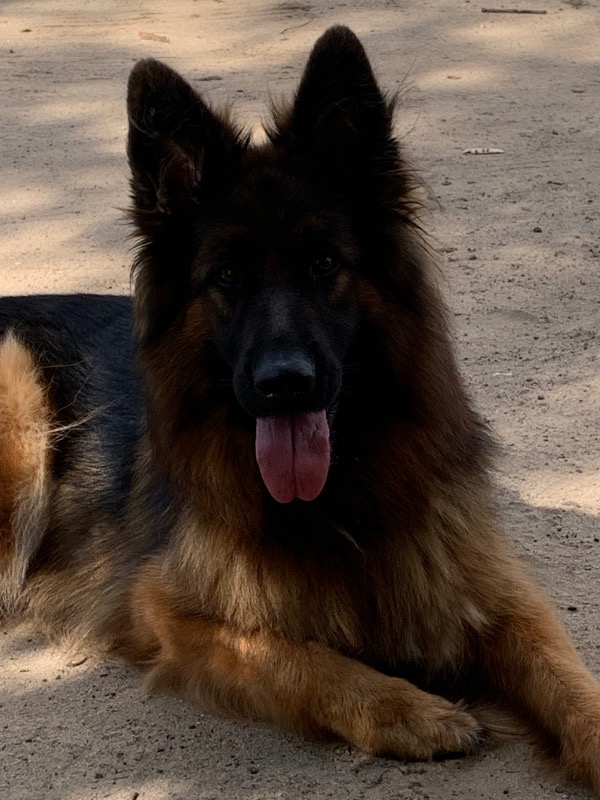German shepherd
Autres noms : German shepherd dog
Discover the German Shepherd, a versatile, intelligent, and loyal dog breed. Valued for its skills in protection, obedience, and work, this faithful companion is also an ideal friend for the family. Adopt a German Shepherd and enjoy its dynamic personality and charismatic presence.
Awareness of acquiring an animal
Adopting or breeding a dog is a responsibility that must be carefully considered. Dogs are loyal companions that require time, attention, and constant care. Whether for leisure, passion, or professional breeding, it is crucial to understand the specific needs of each breed. Provide them with a loving and stimulating environment, and avoid any impulsive acquisition that could harm their well-being. Be a vigilant and committed owner for a happy and healthy companion.
To learn more about animal welfare, we invite you to consult our FAQ by clicking the button below:
Origins and history
The German Shepherd finds its origins in Germany at the end of the 19th century. This dog was developed from various herd dog breeds to meet specific needs, including guarding and herding livestock. Breeders aimed to create an intelligent, robust, loyal dog capable of working closely with humans. The first dog show in Karlsruhe in 1885 marked a decisive turning point for the recognition of this breed.
In the following decades, a standardization of breeding criteria was implemented, which helped stabilize the physical and behavioral traits of the German Shepherd. The first breed club was founded in 1899. The use of dogs in various roles, including as police, search, and rescue dogs, contributed to their growing popularity.
The First World War saw the German Shepherd gain prominence, as it was used by the German army. Its reputation further strengthened after the Second World War, where it was widely used in rescue missions and detection tasks. Today, the German Shepherd is valued worldwide for its skills as a working dog, companion, and protector.
Physical characteristics
The German Shepherd is an iconic dog breed, recognized for its distinctive physical characteristics. Of medium to large size, an adult typically measures between 55 and 65 centimeters at the shoulder. Its weight ranges from 22 to 40 kilograms, depending on the individual and their morphology.
The head is well-proportioned, with a slightly rounded skull and a long, powerful muzzle. The ears, of medium size, are erect and triangular in shape. They are often held upright when alert. The almond-shaped eyes convey an intelligent and attentive expression, typical of the breed.
The body is solid and muscular, with a straight back line that gradually slopes towards a slightly sloped croup. The tail, usually of medium length, is held down but can be raised when the dog is active. The coat is double, consisting of a dense undercoat and a harsh outer coat, offering protection against the elements. The most common colors include black and tan, black and brown, and variations of sable, often marked by distinctive patterns. These characteristics give the German Shepherd a powerful yet elegant appearance.
Character
The German Shepherd is a dog breed particularly appreciated for its numerous qualities. One of the most remarkable character traits of this dog is its intelligence. It is capable of learning quickly and understanding various commands, making it an excellent companion for training and work activities. This aptitude for learning allows it to adapt to various situations, whether it involves obedience, protection, or search tasks.
The German Shepherd is also known for its loyalty and attachment to its family. This dog forms very strong bonds with its owners and often shows protective instincts towards them. Its vigilant nature and guarding instinct make it an excellent watchdog, capable of detecting potential threats.
Moreover, this dog possesses a lot of energy and a significant need for activity. To ensure its mental and physical well-being, it is essential to provide regular exercise. It excels in numerous sports activities, which makes it popular in the world of working dogs, but also as a pet for active individuals.
Finally, the sociability of the German Shepherd depends on its upbringing. When properly socialized from a young age, it can get along well with other animals and children. This makes it an ideal companion for families, provided it receives adequate mental and physical stimulation.
Life expectancy
The life expectancy of a German Shepherd dog typically ranges between 9 and 13 years. This range can vary depending on several factors, including genetics, diet, physical exercise, and veterinary care. These dogs are often prone to certain hereditary diseases that can affect their longevity. Conditions such as hip dysplasia and heart problems can reduce their life expectancy.
A balanced and high-quality diet is crucial for the overall health of this breed. Therefore, appropriate diets can help maintain an ideal weight and prevent obesity, which is a risk factor for many diseases. Additionally, regular exercise is essential to ensure their physical and mental well-being. Active dogs tend to live longer and be healthier.
Furthermore, regular veterinary care plays a key role. Periodic visits to the veterinarian allow for the early detection of diseases and the implementation of appropriate treatments. By considering these factors, owners can help maximize the life expectancy of dogs of this breed.
Exercise and activity needs
The German Shepherd is an active and intelligent dog breed that requires a high level of exercise and activity to maintain its physical and mental health. Due to its origins as a working dog, it is important to provide enough opportunities for it to expend energy. Ideally, it should receive at least 1 hour of intense exercise each day, including walks, jogging, or play sessions.
Varied activities are essential to stimulate its mind. This breed excels in disciplines such as agility, obedience, and search work. Participating in interactive activities helps strengthen the bond between the dog and its owner while providing cognitive challenges. Furthermore, dogs of this breed can become bored quickly if not sufficiently stimulated, which can lead to undesirable behaviors.
Moreover, socialization is crucial. Exposing the dog to various environments, people, and other animals from a young age promotes balanced behavior and reduces the risks of anxiety or aggression. In summary, a well-structured and varied exercise program is essential to ensure the well-being of this dynamic breed.
Recommended diet
The diet of a dog of this breed is crucial for its health and well-being. It is essential to provide it with high-quality food, rich in nutrients suited to its specific needs. Dogs of this breed have an energetic metabolism, which requires a balanced intake of proteins, fats, and carbohydrates.
Proteins, especially those of animal origin, should make up a significant portion of the diet. They are essential for muscle development and tissue repair. Sources such as chicken, beef, or fish are ideal. At the same time, healthy fats, like those found in fish oil, promote healthy skin and a shiny coat.
Carbohydrates, found in whole grains or vegetables, provide energy and essential fiber for good digestion. It is important to avoid excess simple carbohydrates, which can lead to excessive weight gain.
Finally, hydration should not be neglected. Make sure your companion always has access to fresh water, especially after physical exercise. Regular check-ups with a veterinarian will allow for adjustments to the diet based on the animal's age, weight, and activity level.
Training and obedience
The education and training of German Shepherd dogs are essential for ensuring balanced development and harmonious cohabitation with their owners. They are intelligent animals that are very receptive to learning. From a young age, it is crucial to introduce puppies to basic obedience. Simple commands like "sit," "come," and "no" should be taught in a positive and encouraging manner.
Socialization is a key aspect of training. Exposing the puppy to various situations, people, and other animals helps to develop their confidence and prevent fearful or aggressive behaviors. Socialization classes can be beneficial for creating positive interactions in a controlled environment, thus reinforcing learning.
Consistency is paramount when it comes to education. Commands should be used consistently by all family members to avoid confusion. Training sessions should be regular but also short to maintain the animal's attention.
Finally, physical exercise is essential for this breed. German Shepherds need daily mental and physical stimulation. Walks, play, and activities like agility are recommended, as they strengthen the bond between the owner and the animal while promoting successful training.
Behavior with children
The behavior of German Shepherd dogs with children is generally positive, making them a popular choice for families. These dogs are often described as protective, loyal, and affectionate, traits that allow them to form strong bonds with family members, including the youngest ones. Their instinctive guardian nature leads them to watch over children, creating a safe and reassuring environment.
However, it is essential that the dog is properly socialized from a young age. Good socialization includes frequent interactions with children and other animals, which helps develop balanced behavior. It is also crucial to teach children to interact respectfully and gently with the dog to prevent any undesirable behavior, such as pulling on ears or shouting suddenly, which can cause stress in the animal.
Furthermore, training is a fundamental aspect of a German Shepherd's behavior. With consistent and positive training, these dogs can become loyal and well-mannered companions. This reinforces their calm and patient behavior with children, making them capable of handling various situations and participating in family activities.
In summary, a German Shepherd raised in a loving and well-educated environment can be an excellent companion for children, bringing joy and protection to the family dynamic. The key lies in early socialization, positive training, and respectful interactions between the dog and children.
Compatibility with Other Animals
The German Shepherd is a breed appreciated for its intelligence, loyalty, and ability to learn. When it comes to compatibility with other pets, several factors come into play. First of all, these dogs have a strong protective instinct and a sometimes dominant temperament. This can lead to conflicting situations, especially with other same-sex dogs or those that display a submissive attitude.
Early training and socialization are essential. A well-socialized German Shepherd from a young age can get along with other animals, including cats, provided that the latter are also accustomed to being around dogs. Meetings should be supervised to prevent aggressive behaviors.
It is also important to consider the individual personality of the dog. Some German Shepherds are naturally more friendly and tolerant than others. Owners should be diligent in monitoring interactions, especially in the initial weeks. In summary, with attention to socialization and training, a German Shepherd can coexist harmoniously with other pets.
Grooming needs
Grooming and maintenance of a German Shepherd dog are essential for ensuring its health and well-being. First of all, it is important to focus on brushing. This dog has a double coat, consisting of a dense undercoat and longer guard hairs. Regular brushing, ideally two to three times a week, helps prevent the formation of tangles and eliminates dead hair, especially during the shedding period, which usually occurs in spring and autumn.
Next, bathing should be done sparingly, about once or twice a year or only when necessary. A gentle shampoo specifically formulated for dogs should be used to avoid harming the skin or the coat. Additionally, it is essential to regularly check the ears, as this breed is prone to ear infections. Weekly cleaning with a damp cotton ball can help prevent these issues.
Finally, nail maintenance is also crucial. They should be trimmed every month, or as needed, to avoid pain and injury. Good dental hygiene is equally essential; it is advisable to brush the dog's teeth several times a week to maintain its oral health. By incorporating these maintenance practices, the owner ensures optimal well-being for their four-legged companion.
Health
The health of German Shepherds is an important topic for owners and breeders. This breed is predisposed to certain hereditary diseases, including hip dysplasia and elbow dysplasia. These conditions can lead to joint pain and reduced mobility. It is essential to choose responsible breeders who conduct health tests on breeding stock to minimize these risks.
Another common issue is degenerative myelopathy, a progressive disease of the spinal cord that affects coordination and can lead to an inability to walk. DNA tests are available to detect carriers of this condition, and genetic monitoring can help reduce the prevalence of this disorder.
German Shepherds are also prone to developing skin problems, such as dermatitis, often caused by allergies. Good hygiene, a proper diet, and regular veterinary care can help maintain their skin health. In summary, constant vigilance, periodic veterinary check-ups, and education about breed-specific illnesses are crucial for ensuring a healthy and long life for these animals.
Environment and habitat
The German Shepherd is a dog breed primarily developed in Germany in the early 20th century for herding work. Adaptable, it thrives in various environments, whether urban or rural. Its need for regular exercise makes outdoor space a crucial factor, whether it's a fenced yard or access to parks.
This dog is particularly sensitive to weather conditions. Thanks to its dense double coat, it withstands the cold well but requires protection from excessive heat. A temperate and well-ventilated habitat is therefore ideal for its health.
The German Shepherd is an intelligent and active dog that needs mental and physical stimulation. Activities such as long walks, agility, or tracking work are important elements for its well-being. Additionally, it is essential to provide a structured environment, as it responds positively to training and work, thereby fostering a harmonious relationship with its surroundings.
Name ideas
Choosing a name for a German Shepherd is a delicate task that deserves careful consideration. A good name should be easy to pronounce, not resemble common commands, and have a positive sound. Avoid names that are too long or complicated, as they can confuse your dog. Also think about your pet's personality: a name that reflects their temperament or appearance can strengthen your bond.
The origin of your dog can also inspire your choice of name. Since German Shepherds have German roots, names related to German culture or terms that evoke strength and loyalty are good choices. A name can also have personal significance, whether it's a tribute to an actor, a place, or a passion.
Here are some suggestions for names for a German Shepherd: Rex, Luna, Kaiser, Blitz, Götz, Shadow, Willow, Stark, Freya, Max, Zora, Jäger, Tanya, Thor, and Echo. These names fit the characteristics and spirit of this magnificent breed.
Average purchase price
The cost of purchasing a puppy of this breed can vary significantly depending on several factors. Generally, prices range from 800 to 3,000 euros. Puppies from working lines, which are often intended for roles such as police or search and rescue, may cost more due to rigorous genetic selection.
Reputable breeders who ensure good health, appropriate socialization, and pedigree documents tend to charge higher prices. This includes the cost of health tests for the parents, thereby guaranteeing healthy puppies. Furthermore, a good breeder invests in the early education of puppies, which increases the selling price.
Other factors influencing the price include geographical location, demand, and specific characteristics of the dog. Puppies with certain colors or particular traits may also command a higher price. In summary, it is essential to do your research and prioritize ethical breeders to ensure that you acquire a healthy and well-raised animal.
Expenses
Owning a German Shepherd involves a significant financial commitment. On average, monthly expenses can vary considerably depending on the care and services chosen, but a general estimate falls between 100 and 150 euros.
Food costs represent a significant portion of the budget. A dog of this size requires high-quality food, which can cost between 40 and 70 euros per month. It is essential to choose kibble suited to its nutritional needs, particularly based on its age and activity level.
Veterinary care, including vaccinations, deworming, and regular health check-ups, can incur costs of around 10 to 30 euros per month, considering an annual budget that should be spread out.
Finally, one should also consider expenses related to training and socialization, which include obedience classes or activities. These services can cost between 20 and 50 euros per month, depending on the type of training chosen. In summary, the monthly expenses associated with a German Shepherd amount to about 100 to 150 euros but can vary based on the specifics of each dog.
Destination and usage
The German Shepherd is a highly appreciated breed as a pet, thanks to its intelligence, loyalty, and versatility. These dogs are often integrated into families where they become faithful companions. Their protective nature makes them effective guardians, contributing to a sense of security within the home. When socialized properly from a young age, they can interact harmoniously with children and other animals, thus providing a balanced family dynamic.
Additionally, German Shepherds are active dogs that require regular exercise. Daily walks, play sessions, and outdoor activities are essential to maintain their physical and mental health. This also fosters the bonds between the dog and its family. Their intelligence makes them quick learners, allowing them to participate in activities such as agility or obedience, further enhancing their role as interactive pets.
Finally, this breed stands out for its ability to adapt to various environments, whether it's a house with a garden or an apartment, as long as they receive enough attention and exercise. They thrive in an environment where they feel loved and included, making the German Shepherd an ideal choice for those seeking a loyal and devoted companion.
Legislation and regulation
The legislation regarding German Shepherd dogs varies considerably from one country to another, reflecting different cultural and historical attitudes toward animals. In many European countries, this breed is generally well-accepted and does not face specific restrictions. However, identification, registration, and vaccination requirements apply as part of laws governing pet ownership.
In some countries, laws may limit the size and number of animals that can be kept in a household. Additionally, regulations concerning socialization, training, and behavior in public are often in place to encourage responsible behavior from owners.
Conversely, in a few nations, legislation concerning so-called "dangerous" dogs includes restrictions on certain breeds deemed more likely to be aggressive. This may include muzzle and leash requirements, or even bans on ownership in public spaces. However, this generally does not impact the breed itself, which is often praised for its intelligence and loyal character, making it a popular choice among families and professionals.
Overall, proper training and early socialization are often recommended to ensure appropriate behavior from this breed, regardless of the legislative framework.
Official recognition
The German Shepherd is a breed of dog recognized in many countries around the world. In Europe, it is particularly appreciated and often considered a versatile working dog. Countries like Germany, its country of origin, have strict standards of selection and breeding, ensuring healthy lines that conform to the breed's criteria. Canine organizations, such as the Fédération Cynologique Internationale, play a crucial role in its official recognition.
In North America, the recognition is also notable. Dog clubs, such as the American Kennel Club, award titles and certificates to breeders and dogs from respected lines. This recognition fosters a growing interest in the training and socialization of these animals.
In other regions, such as Asia and Latin America, the German Shepherd is experiencing increasing popularity. Efforts are underway to promote its official recognition and improve the living conditions of the animals, as well as breeding practices. However, in some parts of the world, concerns have been raised about genetic health and abuses in breeding, leading to debates over recognition standards.
Pedigrees
To obtain a pedigree for a German Shepherd, several national and international organizations and dog clubs are recognized. These entities play an essential role in responsible breeding and preserving the characteristics of this breed.
At the international level, the Fédération Cynologique Internationale (FCI) is the main organization that establishes standards for dog breeds and promotes ethical breeding. It oversees a network of national clubs, including those specifically dedicated to the German Shepherd. The FCI is known for ensuring that registered dogs meet rigorous conformity criteria, which is crucial for the reputation of a lineage.
In France, the Société Centrale Canine (SCC) is the reference entity. It manages the Livre des Origines Français (LOF), which is the main register for purebred dogs in France, including the German Shepherd. The SCC issues pedigrees after verifying the ancestry and breeding conditions.
Other specialized clubs, such as the Club Français du Berger Allemand (CFBA), also offer services that may include the registration and promotion of German Shepherd breeders. These clubs contribute to organizing exhibitions and competitions, thus providing a platform for breeders and owners.
To guarantee the quality of a purebred dog, health tests and work trials, such as temperament tests and working trials, are often required for obtaining a pedigree. These steps are important for preventing hereditary diseases and ensuring compliance with breed standards. This also allows prospective owners to choose dogs with verified backgrounds and healthy genes.
Prohibitions
Dog breed restrictions, including those for shepherd dogs, vary significantly from country to country. In some countries, these animals are perceived as potentially dangerous due to their size, strength, and protective behavior. As a result, laws may restrict or prohibit their ownership, particularly in urban areas. These measures aim to reduce incidents related to aggressive behavior, even though the majority of dogs are well-socialized and balanced.
In Europe, some countries have implemented strict regulations. For example, numerous local or national legislations impose conditions for ownership, such as requiring specific training for owners, liability insurance, or appropriate living spaces. In other regions, the regulations focus on breeding practices to ensure that dogs are properly socialized and trained from a young age.
In some states in the United States, similar laws exist. Owners may be required to prove their dogs' training or adhere to size or weight limits. Attitudes toward these animals often reflect cultural fears that influence local policies. Debates surrounding these regulations continue, raising questions about the balance between public safety and the rights of pet owners.
Breeders of German shepherd
Want to see more breeders of German shepherd?
Check out the page of our directory listing all breeders of German shepherdClassified Ads of German shepherd
Breed clubs of german shepherd
No of german shepherd breed clubs are currently registered on Preeders.
If you would like to highlight your breed club, sign up for free now and be the first to appear on this page.








